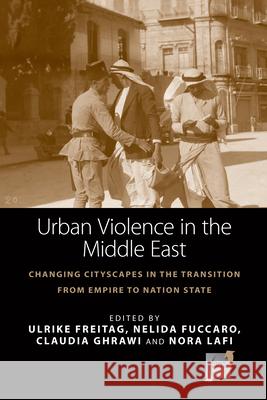Urban Violence in the Middle East: Changing Cityscapes in the Transformation from Empire to Nation State » książka
Urban Violence in the Middle East: Changing Cityscapes in the Transformation from Empire to Nation State
ISBN-13: 9781782385837 / Angielski / Twarda / 2015 / 334 str.
Urban Violence in the Middle East: Changing Cityscapes in the Transformation from Empire to Nation State
ISBN-13: 9781782385837 / Angielski / Twarda / 2015 / 334 str.
(netto: 484,12 VAT: 5%)
Najniższa cena z 30 dni: 502,10
ok. 30 dni roboczych.
Darmowa dostawa!
"This is a very remarkable collection of chapters . . . The totality is a lively read, exhibiting an almost universal familiarity with and appreciation of the literature." - Peter Sluglett, National University of Singapore ." . . the book is timely, it is topical and useful for a more historically grounded understanding of the urban unrest in the Middle East during the last years up to the present." - Christoph Herzog, University of Bamberg Covering a period from the late eighteenth century to today, this volume explores the phenomenon of urban violence in order to unveil general developments and historical specificities in a variety of Middle Eastern contexts. By situating incidents in particular processes and conflicts, the case studies seek to counter notions of a violent Middle East in order to foster a new understanding of violence beyond that of a meaningless and destructive social and political act. Contributions explore processes sparked by the transition from empires - Ottoman and Qajar, but also European - to the formation of nation states, and the resulting changes in cityscapes throughout the region. Ulrike Freitag is a historian of the Modern Middle East with a special interest in urban history and the Arabian Peninsula in its global context. She directs Zentrum Moderner Orient and teaches at the Freie Universitat. She is author of Indian Ocean Migrants and State Formation in Hadhramaut (Brill, 2003). Nelida Fuccaro is Reader in Modern Middle Eastern History at the School of Oriental and African Studies, University of London. She is the author of Histories of City and State in the Persian Gulf (CUP, 2008) and the editor of "Histories of Oil and Urban Modernity in the Middle East" in CSSAAME (2013). Claudia Ghrawi holds a Master of Arts degree in history and political science and studied Arabic in Damascus and Berlin. She works as a research fellow at the Zentrum Moderner Orient and is a Ph.D. student at the Freie Universitat Berlin. Nora Lafi is researcher at Zentrum Moderner Orient and is a historian of the Ottoman Empire with a focus on Urban Studies. She is coeditor of The City in the Ottoman Empire: Migration and the Making of Urban Modernity (Routledge, 2010).
"This is a very remarkable collection of chapters . . . The totality is a lively read, exhibiting an almost universal familiarity with and appreciation of the literature." · Peter Sluglett, National University of Singapore". . . the book is timely, it is topical and useful for a more historically grounded understanding of the urban unrest in the Middle East during the last years up to the present." · Christoph Herzog, University of BambergCovering a period from the late eighteenth century to today, this volume explores the phenomenon of urban violence in order to unveil general developments and historical specificities in a variety of Middle Eastern contexts. By situating incidents in particular processes and conflicts, the case studies seek to counter notions of a violent Middle East in order to foster a new understanding of violence beyond that of a meaningless and destructive social and political act. Contributions explore processes sparked by the transition from empires - Ottoman and Qajar, but also European - to the formation of nation states, and the resulting changes in cityscapes throughout the region.Ulrike Freitag is a historian of the Modern Middle East with a special interest in urban history and the Arabian Peninsula in its global context. She directs Zentrum Moderner Orient and teaches at the Freie Universität. She is author of Indian Ocean Migrants and State Formation in Hadhramaut (Brill, 2003).Nelida Fuccaro is Reader in Modern Middle Eastern History at the School of Oriental and African Studies, University of London. She is the author of Histories of City and State in the Persian Gulf (CUP, 2008) and the editor of "Histories of Oil and Urban Modernity in the Middle East" in CSSAAME (2013).Claudia Ghrawi holds a Master of Arts degree in history and political science and studied Arabic in Damascus and Berlin. She works as a research fellow at the Zentrum Moderner Orient and is a Ph.D. student at the Freie Universität Berlin.Nora Lafi is researcher at Zentrum Moderner Orient and is a historian of the Ottoman Empire with a focus on Urban Studies. She is coeditor of The City in the Ottoman Empire: Migration and the Making of Urban Modernity (Routledge, 2010).











